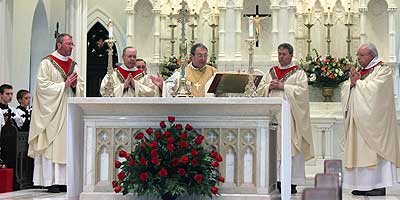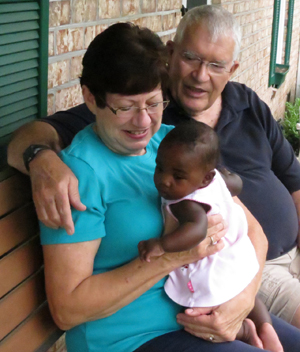![IMG_20170127_104005108[1].jpg-WEB](https://archives.themiscellany.org/wp-content/uploads/2017/01/IMG_20170127_1040051081.jpg-WEB.jpg)
WASHINGTON—Prayer vigils, special Masses and rallies were held to mark the 44th anniversary of the U.S. Supreme Court decision legalizing abortion.
For people in the Diocese of Charleston who attended the National March for Life in Washington, D.C., it was an expression of hope in the future; a feeling that abortion can be turned around, said Kathy Schmugge, director of the diocesan Family Life office.
Schmugge said there were seven full buses carrying about 400 people from across the state that traveled to the capitol for the march, plus many that came in their own cars.
“There was a joy-filled spirit at this march,” she said. “It’s not a protest as much as a celebration of life.”
At a Mass at St. Aloysius Gonzaga Parish in Washington on Jan. 27 prior to the March for Life, Jesuit Father Bill Muller said those joining the daylong event were praying and marching so that everyone, from the unborn child to the dementia patient at death’s door, would “be seen, recognized, noticed and that all belong to our crazy and wonderful human family.”
The problem, however, Father Muller explained, is that not everyone in the human family “sees all who are there. Not everyone wants to hear some others say, ‘I am here, recognize me for who I am.'”
He continued by calling attention to “those who are not seen, who don’t know they belong, who do not have a voice to stand up and shout, ‘I am here.’ Today we call attention to babies in the womb,” he told the congregation.
Recalling the Gospel of Mark in which Jesus compared the kingdom of God to the tiny mustard seed that grows into a large plant. He acknowledged that the gathering at the church was small compared with the population of the world, but that participating in the March for Life was like planting a seed.
“But do not throw away your confidence because all the kingdom of God needs are tiny seeds and people planting them,” he said.

Elsewhere, nearly two dozen parishes in the Boston Archdiocese observed Holy Hours for Life the weekend of the Washington march. Other parishes planned prayer services through mid-February. And the Diocese of Cleveland was among several nationwide that celebrated a Mass calling for the protection of the unborn.
In Los Angeles, thousands of people heard from Archbishop Jose H. Gomez and other speakers during the third annual OneLife LA on Jan. 21 at Exposition Park. The Los Angeles Archdiocese was a lead planner of the gathering.
“OneLife is meant to be a movement,” Archbishop Gomez told those who joined the event. “OneLife is a vision of a society of solidarity, love and service. A vision of a society where we do not see ‘others’ but see only brothers and sisters, children of God who share our common human nature and are deserving of love and care and everything we can do to promote their freedom and dignity.”
Speakers at the ecumenical event included other ministers and actress Patrician Heaton.
Earlier in January, pro-lifers gathered at the Colorado State Capitol in Denver for the Celebrate Life Rally and March. According to The Denver Post daily newspaper, thousands of participants marched through city streets before the event culminated with the rally.
Denver Archbishop Samuel J. Aquila addressed the Jan. 14 event along with several others speakers. Doves were released before the march, which organizers described as a symbol of the Holy Spirit’s presence.
Archbishop Aquila urged the crowd not to grow complacent, even with a new administration in the White House that has pledged to appoint a pro-life justice to the Supreme Court and eliminate taxpayer funding of abortion. He urged them to work to change the nation’s “culture of death,” allowing both abortion and physician-assisted suicide.
“We must not let ourselves grow complacent,” Archbishop Aquila said. “The forces promoting the culture of death have not slowed their pace and we must not slow ours.”
Masses were celebrated at several parishes before the event including at the Cathedral Basilica of the Immaculate Conception. Two weeks later more than 200 people held a March for Life demonstration outside Planned Parenthood to pray for an end to abortion.
In the town of Palmer, Alaska, in the Matanuska-Susitna Valley, more than 300 people turned out Jan. 28 for what is believed to be the first pro-life march in the town. Residents packed the Palmer Depot downtown before marching through the streets to pray for an end to abortion and give peaceful public witness to the dignity and rights of unborn babies.
“Each year, since Roe vs. Wade was decided, hundreds of thousands of pro-life Americans have made their way to Washington, D.C., to demand an end to abortion,” organizers said in a statement. “But D.C. is a long way for we Alaskans to travel, so why not stay closer to home and still share the same message — abortion is a travesty of epic proportions and it must be stopped!”
The Catholic Anchor, newspaper of the Anchorage Archdiocese, reported that participants walked a mile through downtown Palmer, stopping to pray outside the office of abortion doctor Susan Lemagie and also pausing to pray outside Gov. Bill Walker’s local office.
The Catholic Miscellany contributed to this report.
Top photo, special to The Miscellany/Bernadet Best: Participants from the Diocese of Charleston, S.C., join in solidarity with the National March for Life held in Washington, D.C. About 400 people from all seven South Carolina deaneries traveled by buses to attend the event.



